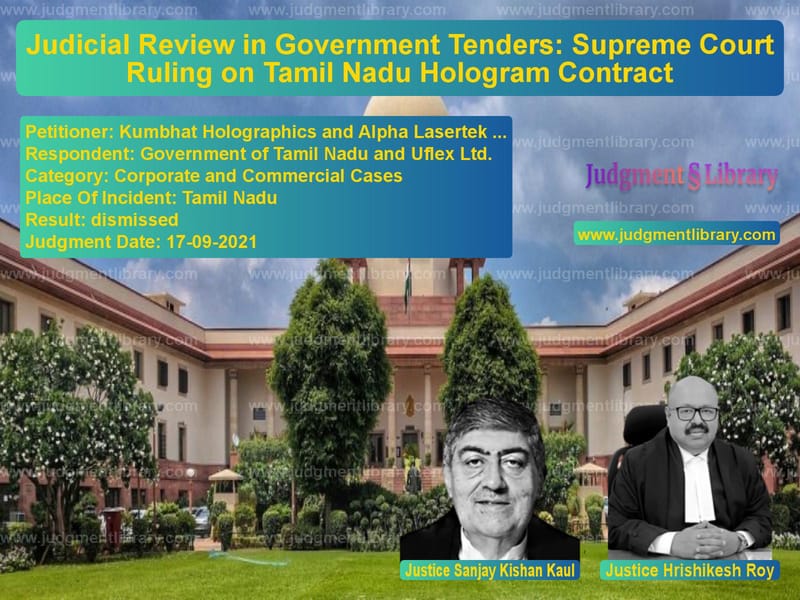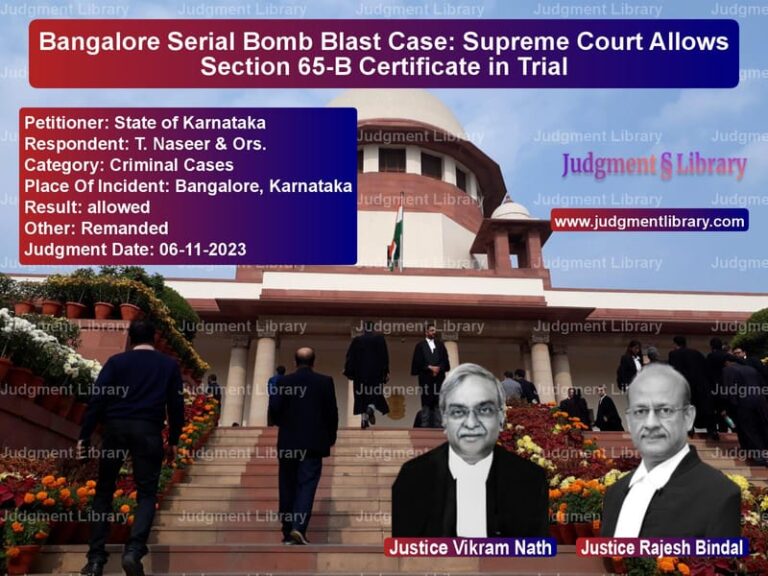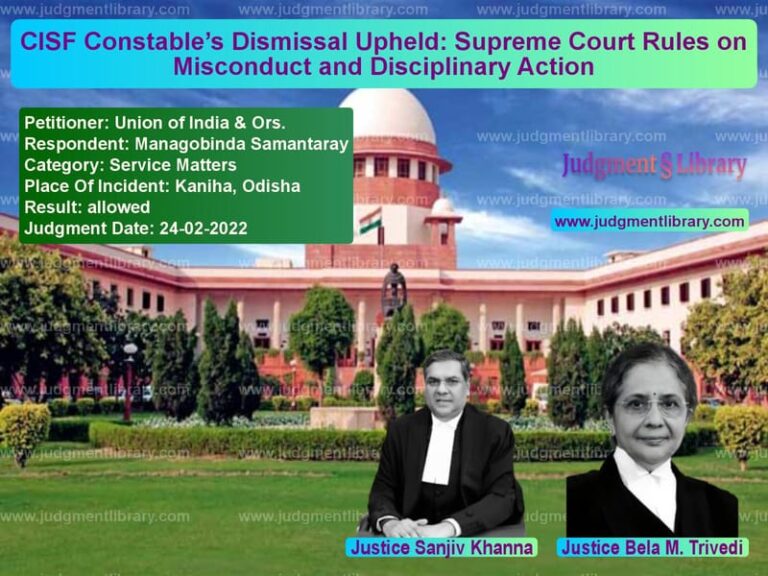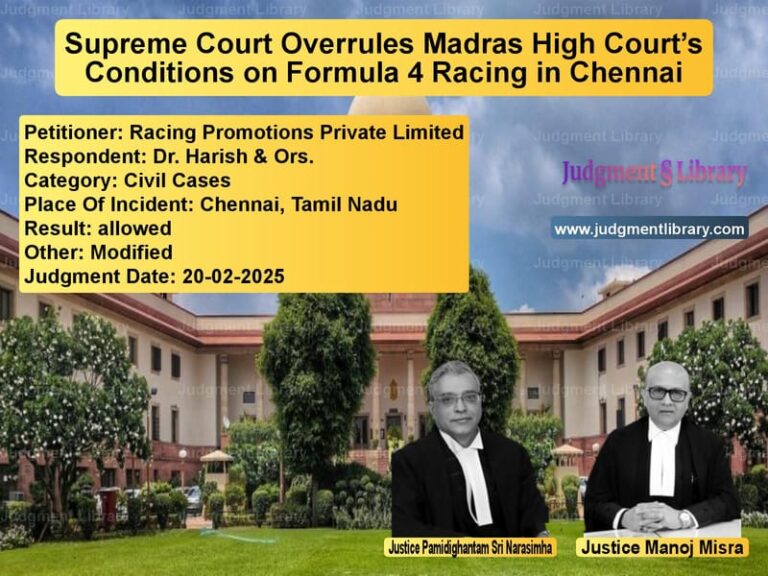Judicial Review in Government Tenders: Supreme Court Ruling on Tamil Nadu Hologram Contract
The case in question involves a legal dispute over the awarding of a government tender in Tamil Nadu for the production and supply of polyester-based hologram excise labels. The Supreme Court was called upon to examine whether the tender process was fair, transparent, and free from arbitrariness. This case highlights key legal principles governing judicial review in contractual matters and the limits of court interference in administrative decisions.
Background of the Case
The Tamil Nadu government issued a tender for the supply of security hologram labels to be affixed on liquor bottles sold through the Tamil Nadu State Marketing Corporation (TASMAC). The objective of this tender was to ensure transparency and prevent counterfeiting in the sale of liquor. The process was overseen by the Joint Commissioner-II (Tender Inviting Authority) and the Commissioner of Prohibition and Excise (Tender Accepting Authority).
The petitioners, Kumbhat Holographics and Alpha Lasertek India LLP, challenged the tender, alleging that the eligibility criteria were designed to favor two specific bidders, Uflex Ltd. and Montage Enterprises. The petitioners contended that the tender terms were discriminatory and excluded legitimate competitors.
Read also: https://judgmentlibrary.com/corporate-insolvency-case-supreme-court-upholds-cirp-withdrawal/
Key Legal Issues
- Whether the Tamil Nadu government’s tender process violated the principles of fairness and transparency.
- Whether the eligibility criteria were arbitrarily set to favor particular companies.
- The extent of judicial review in government contracts.
- Whether the High Court erred in intervening in the tendering process.
Arguments by the Petitioners
The petitioners, Kumbhat Holographics and Alpha Lasertek, put forth the following arguments:
- The eligibility criteria, such as the requirement of having supplied security hologram labels worth at least Rs. 20 crore to a state excise department, excluded legitimate bidders and benefited only two companies—Uflex Ltd. and Montage Enterprises.
- The technical specifications, particularly the requirement for a hidden text feature on a color-change background, were allegedly based on patented technology controlled by Uflex Ltd. and Montage Enterprises.
- Hololive Corporation Industries, which was the third bidder, did not qualify due to technical and financial deficiencies, leaving only Uflex and Montage as eligible bidders.
- The state government failed to ensure a fair competitive process and instead tailored the tender to suit specific bidders.
- There was an alleged financial link between Uflex Ltd. and Montage Enterprises, raising concerns about collusion.
Arguments by the Respondents
The respondents, including the Tamil Nadu government, Uflex Ltd., and Montage Enterprises, countered these claims with the following arguments:
- The eligibility criteria were set to ensure that only financially stable and technically capable companies participated in the tender.
- Past experience in supplying holograms to excise departments was a reasonable requirement, as the nature of the contract demanded high security standards.
- The tender process was transparent, and the technical specifications were designed to prevent counterfeiting of liquor bottles.
- The corrigendum issued during the bidding process allowed additional bidders to qualify, addressing concerns about exclusivity.
- The alleged financial link between Uflex and Montage was not legally relevant, as Montage was an independent company with separate operations.
Supreme Court’s Analysis
The Supreme Court, consisting of Justices Sanjay Kishan Kaul and Hrishikesh Roy, examined the legal principles governing judicial review of administrative actions in government tenders. The Court relied on established precedents, emphasizing that:
- Judicial review in contractual matters is limited to preventing arbitrariness, irrationality, unreasonableness, bias, and mala fides.
- Courts should not interfere in administrative decisions unless they violate constitutional principles or show clear favoritism.
- The tendering authority is the best judge of the requirements for a contract, and courts should defer to its expertise unless there is evidence of wrongdoing.
- Public interest is paramount, and courts should not allow litigation to disrupt essential government functions.
Key Observations
The Supreme Court made several critical observations:
- The petitioners failed to prove that the tender process was manipulated to favor Uflex and Montage.
- The state government followed a transparent process, and the eligibility criteria were not arbitrary.
- The High Court exceeded its jurisdiction by interfering in the tender process and questioning the commercial wisdom of the tendering authority.
- The petitioners’ claim of a monopoly was unsubstantiated, as similar tenders in other states had been won by different companies.
- The judicial system should not be used as a tool by unsuccessful bidders to challenge every tender they fail to win.
Final Judgment
The Supreme Court overturned the High Court’s ruling and reinstated the Tamil Nadu government’s tender process. The Court emphasized the need to maintain the integrity of the government’s decision-making process while ensuring fair competition.
Read also: https://judgmentlibrary.com/tenant-rights-vs-secured-creditors-supreme-court-rules-on-sarfaesi-act/
The Court also imposed costs on the petitioners for filing frivolous litigation. It ruled that Kumbhat Holographics and Alpha Lasertek must pay Rs. 23.25 lakh to Uflex Ltd. and Rs. 7.58 lakh to the Tamil Nadu government as legal costs.
Conclusion
This landmark judgment reinforces the principle that judicial interference in government tenders should be minimal and reserved for cases of clear illegality or arbitrariness. The ruling clarifies that while public tenders must be transparent, courts should not micromanage the decision-making process of government authorities.
The case serves as a precedent for future disputes, ensuring that commercial considerations are not overridden by unwarranted litigation and that tender processes remain efficient and competitive.
Petitioner Name: Kumbhat Holographics and Alpha Lasertek India LLP.Respondent Name: Government of Tamil Nadu and Uflex Ltd..Judgment By: Justice Sanjay Kishan Kaul, Justice Hrishikesh Roy.Place Of Incident: Tamil Nadu.Judgment Date: 17-09-2021.
Don’t miss out on the full details! Download the complete judgment in PDF format below and gain valuable insights instantly!
Download Judgment: kumbhat-holographics-vs-government-of-tamil-supreme-court-of-india-judgment-dated-17-09-2021.pdf
Directly Download Judgment: Directly download this Judgment
See all petitions in Corporate Compliance
See all petitions in unfair trade practices
See all petitions in Judgment by Sanjay Kishan Kaul
See all petitions in Judgment by Hrishikesh Roy
See all petitions in dismissed
See all petitions in supreme court of India judgments September 2021
See all petitions in 2021 judgments
See all posts in Corporate and Commercial Cases Category
See all allowed petitions in Corporate and Commercial Cases Category
See all Dismissed petitions in Corporate and Commercial Cases Category
See all partially allowed petitions in Corporate and Commercial Cases Category







